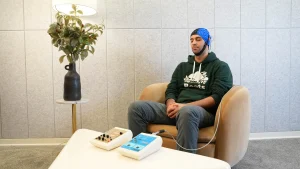With the holiday season just beginning, there couldn’t be a better reason to talk about invisible disabilities. Meeting with family, connecting with old friends, and spending time with loved ones… socializing for the season is an activity. For some, it can be the busiest time of the year with the social calendar blocked out. While reconnecting with people is a fun activity, we need to be aware that over time things change, and so do people. Invisible disabilities can take over the lifestyle of a person, and it may not be apparent. Some may be living with the conditions all their life without knowing, and some may develop conditions over time. Either way, compassion, and understanding are called for regardless of the situation.
From personality disorders to chronic pain, ADHD, autism, bulimia, migraines, and more…the hidden health problem is a mountain of an issue. Invisible disabilities like cognitive impairments PTSD, depression, and anxiety may develop at any time and have grave impacts. Not all can be helped with a parking spot or with a sticker on their car.
It is difficult to know if someone faces invisible disabilities; however, it is not impossible to see new or peculiar habits of the person. Usually labeled wrongly, these issues get hidden under the rug for being ‘nothing.’ 96% of people with chronic medical conditions live with invisible disabilities. Those living with a hidden physical disability, or a mental challenge are still able to be active in their hobbies, work, and in sports. On the other hand, some struggle just to get through their day at work or school, and some cannot function at all.
A Solution:
Neurofeedback & TMS: Neurofeedback and Transcranial Magnetic Stimulation (TMS) are two relatively new technologies used to address the symptoms of invisible disabilities among a host of other disabilities and mental illnesses. Coupled with counseling, nutrition, and medicines if needed, both of these treatments are long-lasting and provide gradual relief to the situation. Neurofeedback and TMS are simple and non-invasive brain technology solutions that can alleviate many of these invisible disabilities. Neurofeedback is regularly used to treat ADHD, anxiety, Autism and PTSD, migraines, and recovery from traumatic brain injuries, whereas TMS is commonly used as a treatment of choice for depression, OCD, chronic pain, and substance abuse.
At Elumind, we first do a QEEG brain map that assesses the parts of your brain impacted due to invisible disabilities. We then offer a Therapeutic Assessment, where your life history is assessed. We then use this information to recommend treatment plans along with other ancillary support that may be needed.
This holiday season, you can give yourself or a loved one the gift of healing through therapy by sponsoring sessions. Contact us today and book a free phone appointment: https://elumind.com/booking/
Elumind Centres for Brain Excellence is an integrated mental health centre offering solutions that can help you with your mental/brain health needs. To start your journey, book your FREE 15-MINUTE PHONE CONSULTATION. We are here for you.








